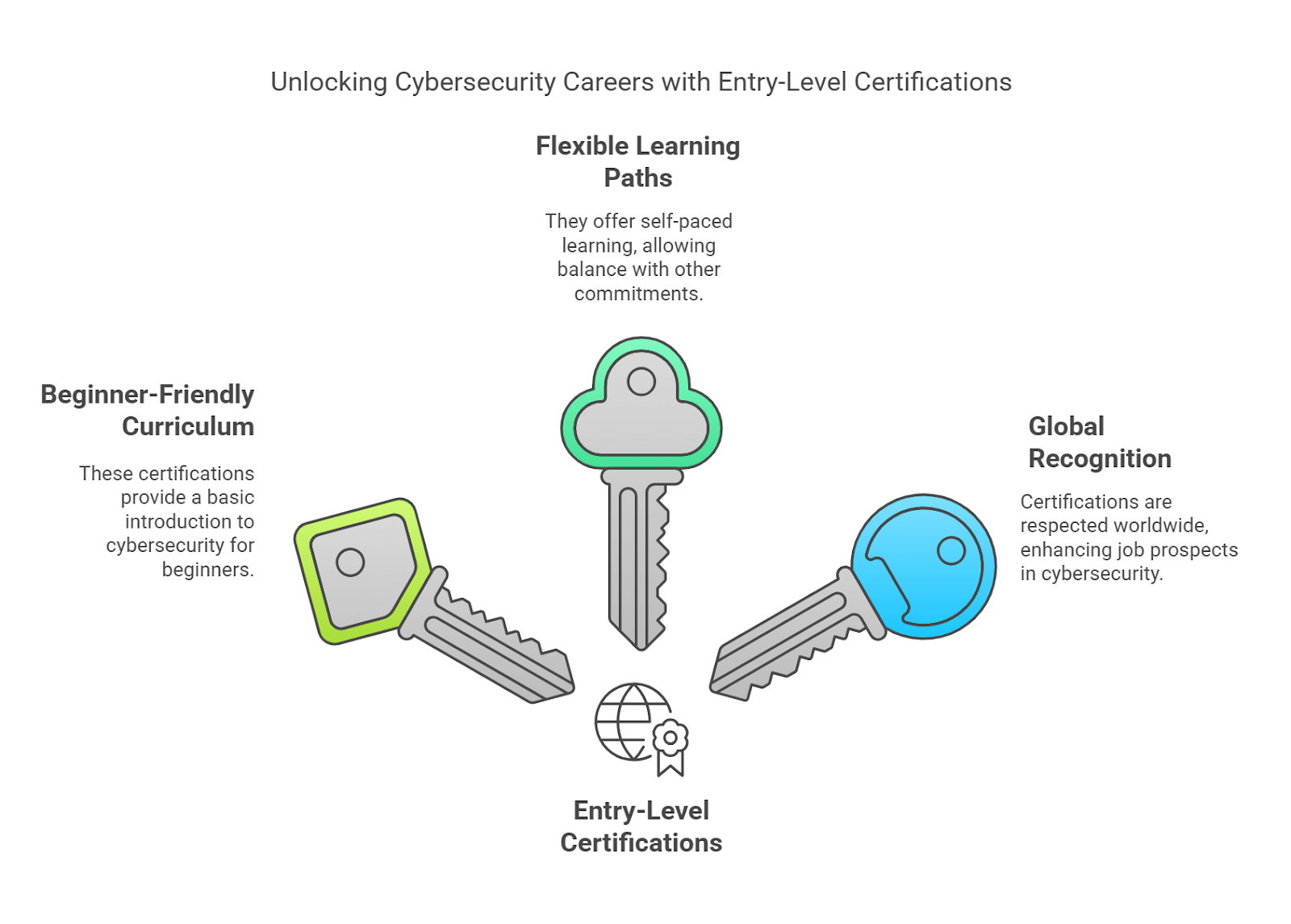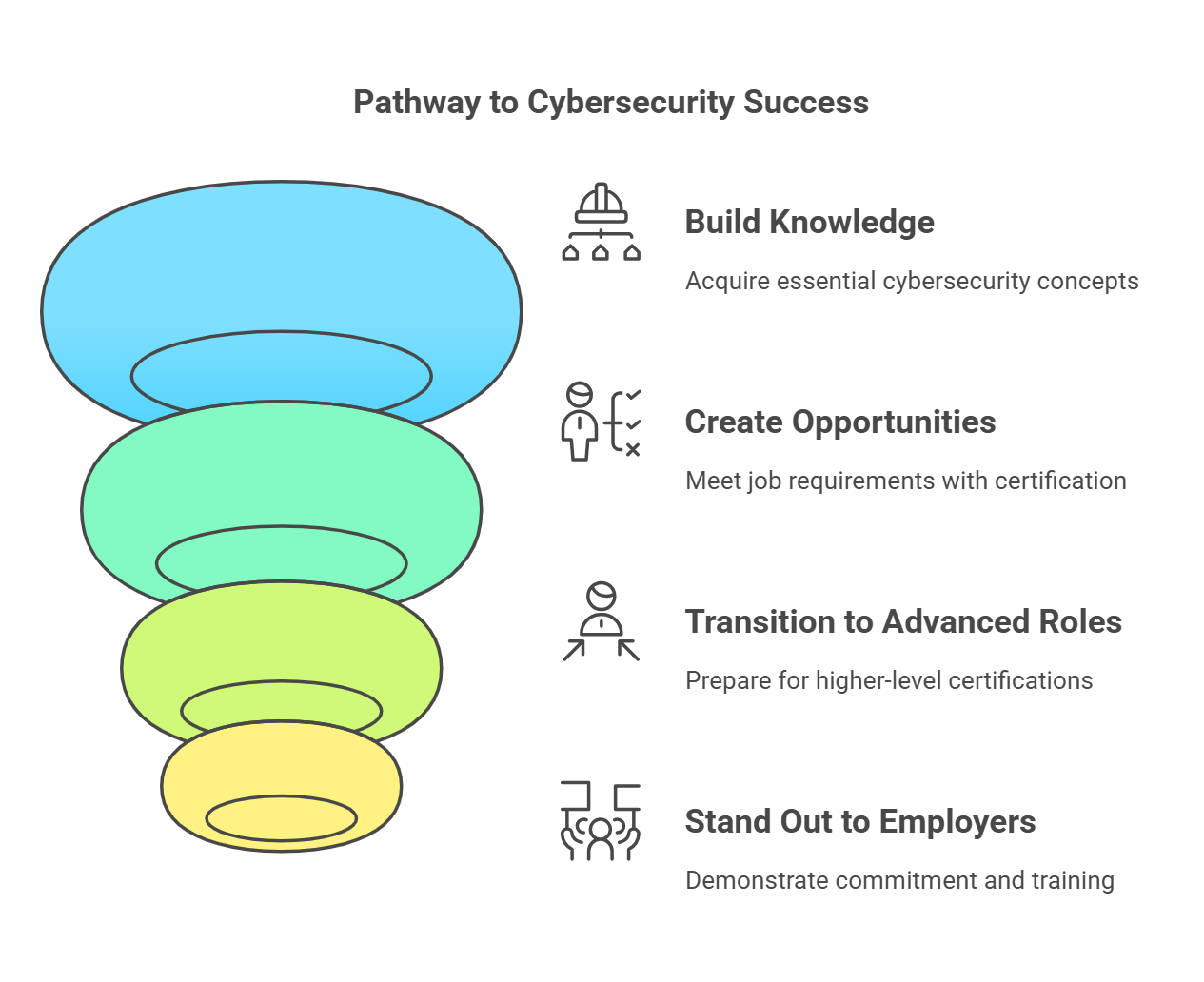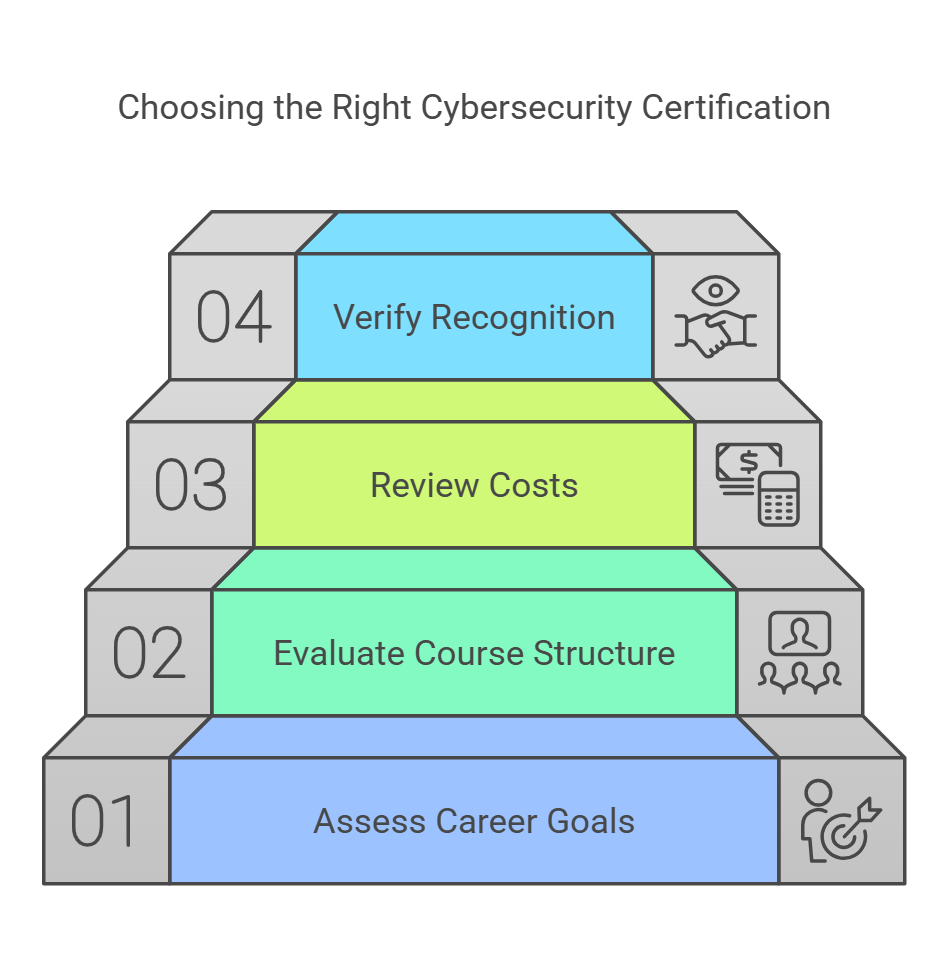Table of Contents
- What Is an Entry-Level Cybersecurity Certification?
- Key Attributes of Entry-Level Certifications
- 1. Beginner-Friendly Curriculum
- 2. Flexible Learning Paths
- 3. Global Recognition
- Why Does an Entry-Level Cybersecurity Certification Matter in 2025?
- Benefits of Earning an Entry-Level Cybersecurity Certification
- Top Entry-Level Cybersecurity Certifications for 2025
- How to Choose the Right Entry-Level Cybersecurity Certification
- Informative Table Comparing Entry-Level Cybersecurity Certification Programs
- Final Thoughts
- FAQs About Entry-Level Cybersecurity Certification
Cybersecurity is a critical field in today’s digital world, with threats becoming more sophisticated every day. For beginners looking to enter the field, an Entry-Level Cybersecurity Certification is the perfect starting point. These certifications provide the foundational knowledge and practical skills required for roles such as Junior Security Analyst, Vulnerability Tester, or SOC (Security Operations Center) Analyst. By completing these certifications, you’ll prove to employers that you are job-ready and prepared to secure their systems.
What Is an Entry-Level Cybersecurity Certification?
An Entry-Level Cybersecurity Certification equips you with the basic knowledge needed to identify and protect against common cyber threats. These programs cover essential topics such as network security, threat analysis, and compliance regulations. In 2025, these certifications also focus on cloud security, AI-driven attacks, and zero-trust models. Even with no prior experience, these certifications provide practical hands-on labs that make you ready to enter the Cybersecurity Certification Without Experience workforce.
Key Attributes of Entry-Level Certifications
Entry-level certifications are designed to provide foundational knowledge and skills. They focus on essential concepts, often with practical applications. These certifications typically require minimal experience, making them accessible to beginners. They serve as a stepping stone to more advanced qualifications in various industries.

1. Beginner-Friendly Curriculum
These certifications are designed for individuals with minimal IT experience. They offer a comprehensive introduction to cybersecurity concepts, helping newcomers grasp essential concepts like network defense and risk management.
2. Flexible Learning Paths
Most entry-level certifications are self-paced, allowing you to study at your own convenience. This flexibility makes it possible to balance learning with other commitments, such as full-time work or studies, while progressing through the material at your own pace.
3. Global Recognition
Certifications like CompTIA Security+ and Cisco CyberOps are widely recognized across industries and are respected by employers worldwide, making them excellent credentials for securing a job in cybersecurity.
Why Does an Entry-Level Cybersecurity Certification Matter in 2025?
An entry-level cybersecurity certification in 2025 is crucial for building foundational knowledge and skills. It opens doors to high-demand job opportunities. Employers look for certified candidates who demonstrate a strong understanding of security fundamentals. Earning this certification can set the stage for future career growth in the expanding cybersecurity field.

1. Building Foundational Knowledge
Entry-level certifications lay the groundwork for a successful cybersecurity career. You’ll gain an understanding of basic concepts like threat identification, securing networks, and following industry regulations, all of which are fundamental for success in cybersecurity.
2. Creating Job Opportunities
Many employers require certifications as a baseline qualification. With an entry-level certification, you’ll meet the requirements for a variety of entry-level roles, making it easier to land your first cybersecurity job and begin your career.
3. Easier Transition to Advanced Roles
Starting with foundational certifications makes it easier to pursue advanced credentials in the future. Certifications like CISSP or CEH become much more manageable once you’ve built a solid foundation.
4. Standing Out to Employers
Holding an entry-level certification shows employers that you are committed to your professional growth. It also proves that you’ve been trained in industry-standard practices, helping you stand out in a competitive job market.
Benefits of Earning an Entry-Level Cybersecurity Certification
Earning an entry-level cybersecurity certification opens doors to a wide range of job opportunities. It helps you build a strong foundational knowledge in cybersecurity, making you a competitive candidate. With industry recognition, these certifications enhance your credibility and increase your earning potential. Additionally, they provide a clear pathway for further career growth and specialization.
1. Low-Cost, High-Reward Investment
Entry-level certifications are significantly more affordable than traditional college degrees. For the cost of a few hundred dollars, you gain practical cybersecurity skills and improve your employability, which can lead to higher earning potential.
2. Employability Across Multiple Sectors
Cybersecurity is crucial for organizations in a variety of industries, from finance to healthcare. Certification opens doors across sectors, making it easy to transition between industries and find opportunities in a rapidly growing field.
3. Hands-On Experience Without Prior Work Exposure
Even if you’re new to IT, hands-on labs and simulations included in these certifications help you apply your knowledge to real-world scenarios. This practical experience builds your confidence and prepares you for day-to-day tasks in cybersecurity roles.
4. Rapid Career Entry
Most entry-level certifications can be completed within 6 weeks to a few months. This allows you to quickly gain the skills needed to enter the cybersecurity job market and start working right away.
5. Growth Potential
These certifications not only prepare you for entry-level jobs but also serve as the first step toward specialized roles like Penetration Tester or Cloud Security Engineer, with higher earning potential and career advancement opportunities.
Top Entry-Level Cybersecurity Certifications for 2025
1. CompTIA Security+
-
Overview: This certification provides a solid understanding of network security, risk management, and cryptography. It’s widely recognized and ideal for beginners.
-
Who It’s For: Perfect for those new to cybersecurity, as it focuses on core concepts and problem-solving.
-
Perks: Security+ prepares you for a wide range of entry-level roles, making it a great starting point.
2. Cisco Certified CyberOps Associate
-
Overview: Teaches you how to monitor and manage security in a Security Operations Center (SOC).
-
Who It’s For: Best for those interested in threat detection and containment.
-
Perks: A stepping stone toward more advanced Cisco certifications, helping you specialize in network security.
3. Microsoft Azure Security Fundamentals
-
Overview: Focuses on securing cloud environments, specifically Microsoft Azure, which is becoming an essential skill as businesses move to the cloud.
-
Who It’s For: Beginners looking to specialize in cloud security.
-
Perks: With the increasing importance of cloud security, this certification is in high demand and offers job security in a growing field.
4. Certified Information Systems Security Awareness (CISSA)
-
Overview: This certification provides a comprehensive understanding of cybersecurity protocols and serves as a great introductory course.
-
Who It’s For: Entry-level IT professionals eager to dive into the technical side of cybersecurity.
-
Perks: CISSA is an excellent way to jump-start your cybersecurity career by offering foundational skills that are easily transferable to other roles.
5. ACSMI Certification with 400+ Modules
-
Overview: ACSMI offers a modular certification with over 400 modules covering a broad spectrum of cybersecurity topics like AI-powered defenses, IoT security, and ethical hacking.
-
Who It’s For: Suitable for both beginners and those looking to deepen their cybersecurity knowledge.
-
Perks: With its wide coverage, ACSMI provides a comprehensive learning experience that equips you with specialized skills for more advanced roles.
How to Choose the Right Entry-Level Cybersecurity Certification
Choosing the right entry-level cybersecurity certification depends on your career goals and interests. Start with certifications like CompTIA Security+ or CEH, which provide a solid foundation. Consider the areas of cybersecurity you’re passionate about, such as network security or ethical hacking. Research the job market to ensure the certification aligns with industry demand.

1. Assess Your Career Aspirations
Think about where you want to specialize in cybersecurity. Whether it’s cloud security, penetration testing, or network monitoring, choose a certification that aligns with your career goals.
2. Evaluate Course Structure
Make sure the course is well-structured with both theoretical knowledge and practical labs. Platforms like ACSMI offer interactive labs that allow you to apply what you’ve learned in real-world simulations.
3. Review Certification Costs
Entry-level certifications are affordable, generally ranging between $200 – $600. Choose a certification that fits your budget while offering robust resources, such as ACSMI’s affordable and comprehensive modules.
4. Verify Industry Recognition
Check that the certification is respected by employers. Recognized certifications like CompTIA Security+ or CISSA will stand out on your resume and increase your chances of getting hired.
Informative Table Comparing Entry-Level Cybersecurity Certification Programs

Final Thoughts
Earning an Entry-Level Cybersecurity Certification is the perfect way to begin your career in cybersecurity. With the right certification, you gain the foundational skills needed to succeed in a growing and dynamic field. Whether you pursue CompTIA Security+ or ACSMI, you’ll be well-prepared for a variety of roles that will set you on the path to more advanced and lucrative cybersecurity positions. Start your journey today and unlock a world of opportunities in the cybersecurity industry!
FAQs About Entry-Level Cybersecurity Certification
Do I Need Prior IT Knowledge to Enroll?
No! These certifications are designed for beginners, and no prior IT experience is necessary.
How Long Do Certifications Take?
Completion time generally ranges from 6 weeks to 6 months, depending on the certification.
What Is the Average Cost?
Entry-level certifications generally cost between $200 and $600, making them an affordable way to kickstart your career.
Which Jobs Can I Obtain with Certification?
Roles like SOC Analyst, Junior Cybersecurity Analyst, and Vulnerability Tester are common entry-level jobs.
Do Certifications Expire?
Yes, many certifications, including CompTIA Security+, require renewal every 2-3 years.

Leave a Reply